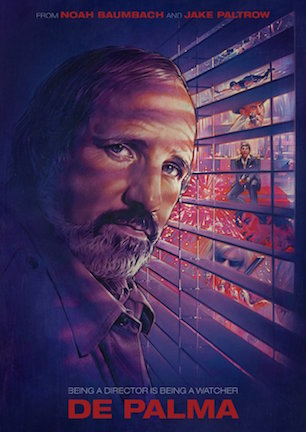Studio: A24
Director: Noah Baumbach, Jake Paltrow
Writer: Noah Baumbach, Jake Paltrow
Producer: Noah Baumbach, Jake Paltrow
Stars: Brian De Palma
Review Score:
Summary:
Director Brian De Palma reflects on his career with recollections and anecdotes covering his complete filmography.
Review:
“De Palma” is framed inauspiciously to the point of being initially awkward. The accomplished director sits slightly slouched in his chair, dressed like a dad dropping his kid off at karate practice. A lone camera captures him coldly, mostly in a motionless medium shot so ordinary, De Palma would never permit it in one of his films. Unheard questions are asked in between edits. There are no talking heads except his. If nothing else, for better or for worse “De Palma” is one hour and 50 minutes of the filmmaker truly in his own words.
“De Palma” isn’t a technically polished documentary. The movie moves through material fast, not always segueing sleekly. Audible changes in ambient sound signal when voiceovers are rearranged or spliced in after the fact.
Yet as the conversation continues, what starts as arm’s length intimacy supplemented with irrelevant background bits gradually warms into an intriguing fireside chat about craftsmanship in the context of a specific career. Once the time tunnel trip through his complete catalog gets in a groove, Brian De Palma gets in one too, and the storytelling session hits its stride.
“De Palma” has nearly everything that can be imagined for a Hollywood BTS bio-doc. Love “what if” scenarios of alternate casting and “could have been” projects? Imagine if Steven Spielberg and Lawrence Kasdan hadn’t sold De Palma on Kevin Costner, leaving him with his pick of Don Johnson as Eliot Ness for “The Untouchables.” Or if pettily digging at producer Don Simpson didn’t take priority over agreeing to do “Flashdance.”
“De Palma” has dirt too. Some of it his, but most of it belonging to others. Much of this involves quick hits like Orson Welles not learning his lines or Cliff Robertson being one of several veteran actors who proved challenging to work with. Better beats come when De Palma chokes on chuckles. Al Pacino burning him on a “Carlito’s Way” subway scene and Sean Penn purposefully pushing Michael J. Fox’s buttons on “Casualties of War” are two particularly entertaining recollections.
Collectively through these anecdotes, multiple sides of the moviemaker are seen. Reflections come from a candid man so far removed from the business-minded maze of celebrity egos and back room backstabbing, he isn’t terribly concerned with protecting imaginary legacies through revisionist history.
There’s no sense of dirty laundry malice either. At worst, De Palma comes off as an occasionally mischievous saboteur, intentionally doing things he suspect won’t work, but experimenting anyway to irk an irritated producer. De Palma has the humor of hindsight when recalling feuds, more or less reflecting on creative differences with a hatchet-long-buried laugh of copacetic resolution.
What you won’t see is a bright spotlight on De Palma as a man. Personal details are only shared selectively when they relate to specific influence on screenplays, such as telling a psychiatrist he was a homosexual Communist in order to avoid Vietnam or stalking his father when he was cheating on his mother, scenes later written into his films.
“Gale” is spoken aloud, although “Anne Hurd” isn’t. So if you’re in the dark about his second wife’s full identity, the movie isn’t turning on that light, for instance. Then again, Brian De Palma is such a skillful storyteller that he succinctly sums up this marriage in a single sentence: “Gale and I fell together at a certain time in our lives and then basically went back to the lives that we hadn’t finished.”
The true value of “De Palma” is the casually delivered insight on creating cinematic suspense and what directing is as both artform and job. De Palma dispenses wisdom in words that are throwaway notions of obviousness to him, yet indispensible gold to fans and other filmmakers.
De Palma even influences perception of films that aren’t his. His personal assessment of Stanley Kubrick’s “Barry Lyndon” explains the purpose of slow zooms in a period piece. When De Palma opines that “movies are a record of the things you didn’t finish,” immortalizing every mistake and shortcut, the mind might wander to his friend George Lucas’ desire to recut the “Star Wars” special editions based on that very same notion.
That any singular voice can have such sway over conception of an entire medium is astonishingly remarkable. And “De Palma” captures that remarkable voice with a comprehensive collection of copious clips, memories, and revelations that are fascinating to hear, see, discover, and savor.
Review Score: 85






“We Bury the Dead” doesn’t have enough meat on its bones to land on a list of top ten zombie films for any of its three release years.